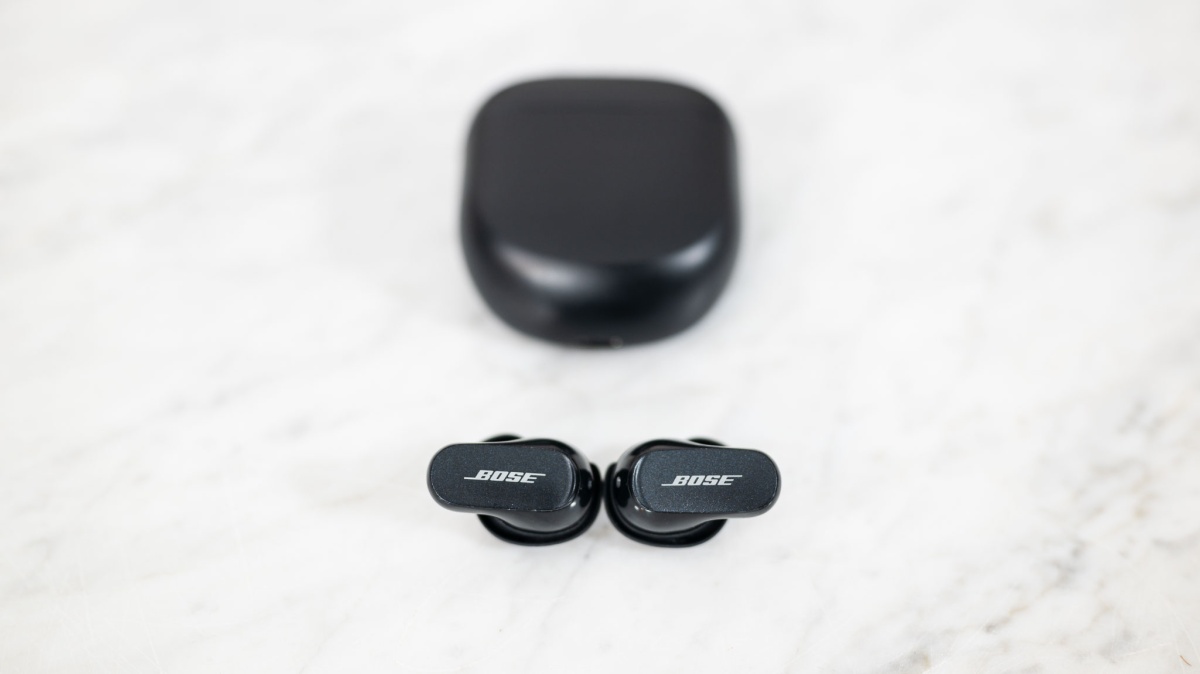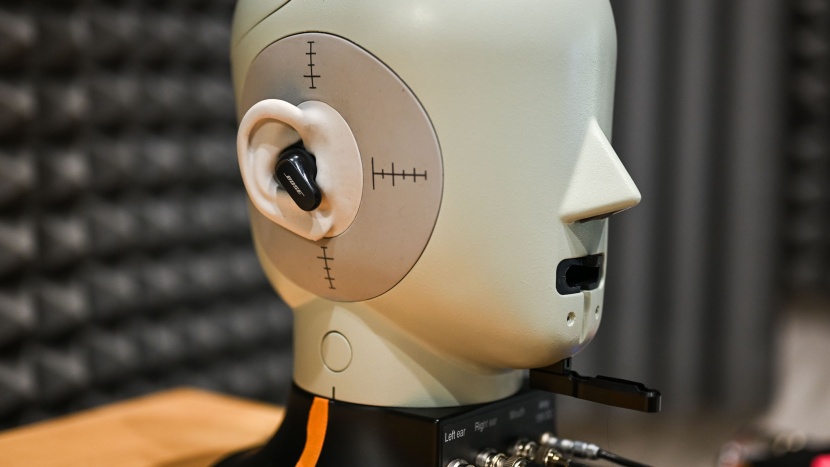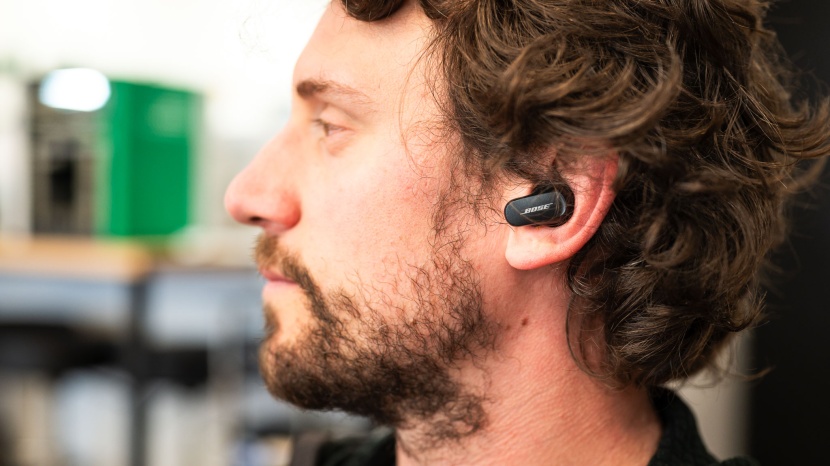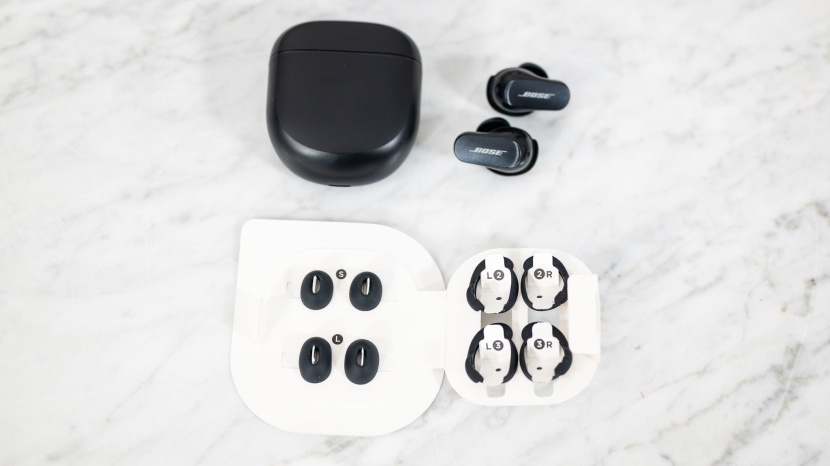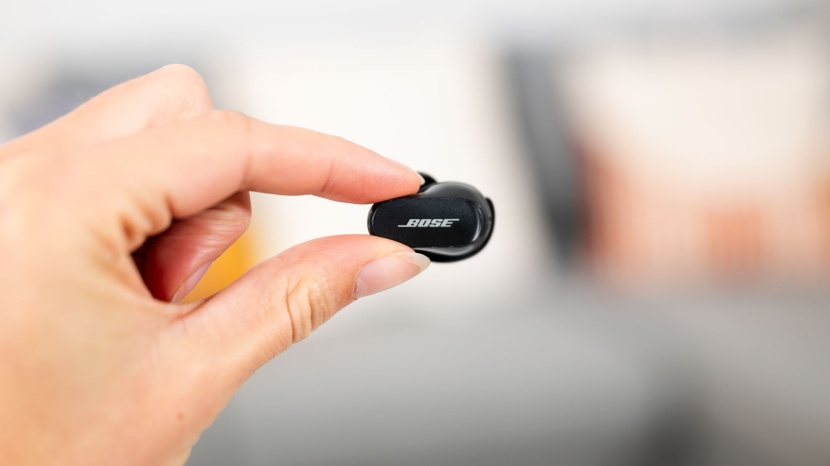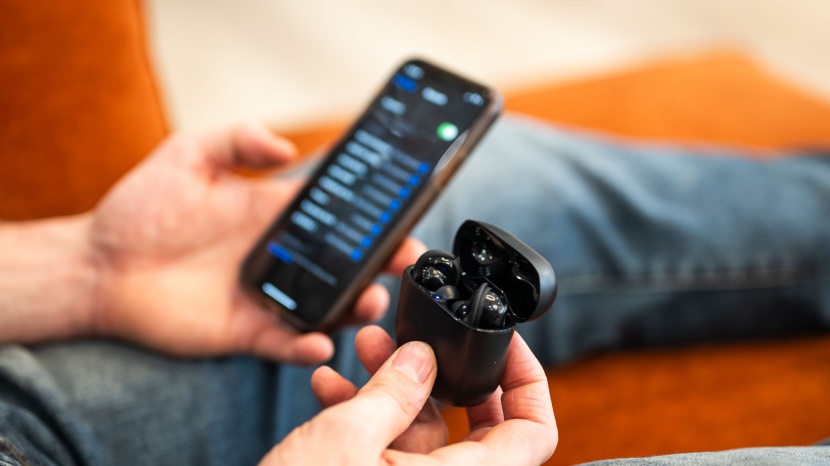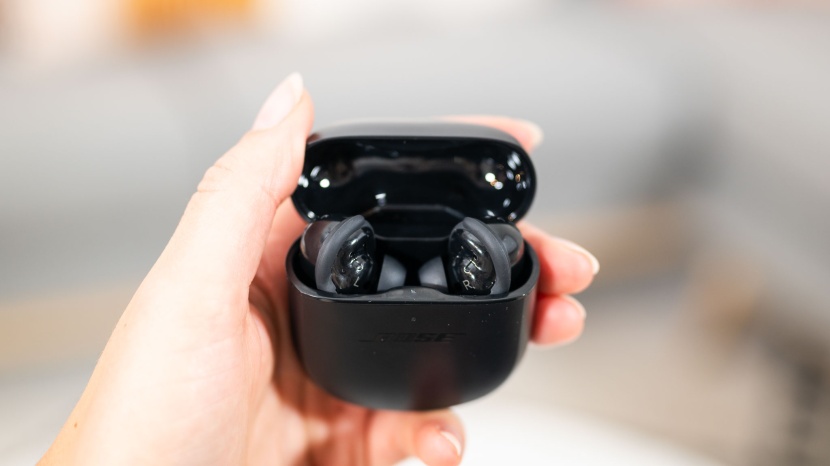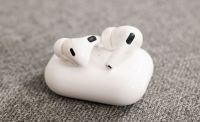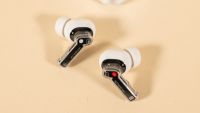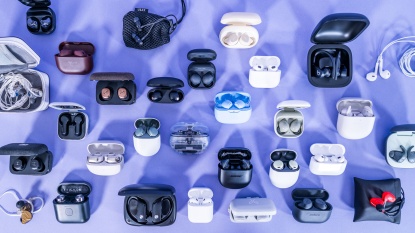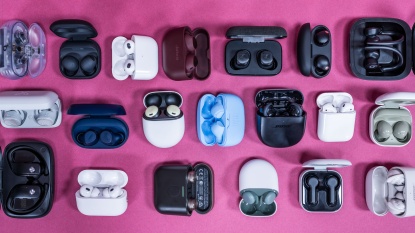
Our Verdict
Our Analysis and Test Results
The Bose QuietComfort II improves upon the original Bose QuietComfort with better sound, ANC, and microphone quality. While lacking a few premium features of the Ultras, the Bose QuietComfort IIs perform excellently in every metric that we tested.
Sound Quality
The Bose QuietComfort II has an excellent sense of clarity, allowing you to hear the separation between instruments and complex layers of sound in a myriad of music styles. The QuietComfort II is fairly high definition compared to most and creates a much more nuanced listening experience.
The well-rounded frequency mix delivers a balanced and enjoyable audio experience. The treble is smooth, while the bass is powerful without overwhelming the mix, ensuring that you won't find yourself wincing from harsh highs or blown-out lows. Songs like “I Wanna Dance With Somebody” by Whitney Houston and “Just Another Honky” by the Faces sound fabulous.
The rich, thick bass frequencies are fully fleshed out, maintaining clarity and balance even at higher volumes. In Marlon Craft's “Something Wrong in Heaven,” the prominent bass line has a distinctive riff during the chorus and continues to shine throughout the verses. From 1:43 to 1:50, you can clearly hear its gymnastic leaps coming through with warmth and power.
These earbuds tend to emphasize lower frequencies, drawing attention to the most interesting and fluid elements of the track. For songs like this, where the bass line is the centerpiece, the earbuds truly enhance the listening experience, encouraging you to savor those hearty lows.
The earbuds maintain sound quality even when cranked up to higher volumes, allowing for a powerful listening experience without a significant loss of clarity.
The mid-tones are warm and nuanced, only losing a bit of depth in their lowest frequencies. In Allison Krauss & Union Station's “When You Say Nothing At All,” Krauss's delicate voice paired with the resonant guitar in the introduction showcases the earbuds' ability to flesh out even the simplest of songs. The balance is well-maintained throughout the piece, with Krauss' voice soaring once the drums kick in at 0:48.
At mid-volumes, the treble range sounds gorgeous, bright, and clear without any harshness. Even at higher volumes, while it begins to sound a bit thin, it never crosses into tinny or overly sharp territory. Their performance at lower volumes remains strong, with clearly defined instruments and vocal lines, ensuring a balanced listening experience across different volume levels.
Soundstage
Soundstage refers to how earbuds allow you to perceive the location of music in three-dimensional space. While it's rare for earbuds to offer an expansive soundstage, technological advancements help music feel like it's emanating from outside your ears rather than within them.
The clarity that the QuietComfort II achieves allows the listener to easily hone in on specific instruments within a song. For example, when listening to “All Too Well (Taylor's Version)” by Taylor Swift, the forlorn guitar intro from 0:01 to 0:22 stands out instead of getting lost in the mix with lesser earbuds. This creates a sense of being in the room with the musicians. You can direct your attention to each instrument and become acutely aware of how they fit into the mix. Lesser earbuds can often feel muddy and compressed, but the QuietComfort II allows you to hear more of the musicians' and producers' efforts.
When tested against our Gearlab House Curve using our high-tech sound measuring equipment, our expert's assessments were spot on, showing a contiguous following of our curve throughout the frequency spectrum, deviating slightly in the treble and bass.
At higher volumes, the QuietComfort II become slightly compressed, losing its sense of high definition in the treble spectrum. However, at average volume, this phenomenon becomes unnoticeable. When listening to high-treble audio, like recordings of rain sounds, the QuietComfort II is extremely clear, allowing for the differentiation of droplets hitting the window pane.
Comfort and Fit
We wore the Bose QuietComfort II in various circumstances, with different ear sizes and shapes. Features like the ear stabilizer wings and the app's ear fit test are enjoyable. The QuietComfort II offers a collection of three tips and three wing sizes, allowing for customization that can accommodate most ear shapes. Over longer listening sessions, they feel weighty and pressuring after one hour.
Stability
The Bose provide a fairly stable fit, only coming loose in smaller ears during a headstand test. They didn't feel secure enough to do highly athletic activities (running, mountain biking, etc.) in smaller ears. Our larger-eared testers had fewer stability issues but also noted the heft of these earbuds. After customization with fins and tips, they feel stable in medium to large ears, but the heft and shape can be cumbersome for smaller ears, especially during physical activity.
Noise Cancellation
Bose has been a frontrunner in the noise-cancelling earbud market for over two decades, and the Bose QuietComfort II is no exception. Noise cancellation not only helps block the outside world so you can focus on your task at hand, but also helps isolate the sound playback to provide a more immersive listening experience. We tested noise cancelling by first checking the earbuds' passive seal with ANC off. Then, we tested with ANC turned on.
The QuietComfort II were some of the best noise-cancelling earbuds that we've tested. Low-pitched hums vanish, and even high-pitched whirs disappear, which is a difficult feat for ANC to achieve (and rarely achieved by others).
The QuietComfort II buds only have two modes: ANC and Aware. This means that the microphones are either working to let noise into your ears or keep noise out. There is no true passive mode. You can create a custom mode, but to some degree, the mics are always active, adjusting your listening experience. There is also a feature called “Activesense” which will kick in no matter what if your listening environment becomes too noisy. This is not inherently negative, but if you're hoping to completely disable ANC, you can't with these buds.
The graph above shows the difference in passive versus active noise cancellation of the Bose QuietComfort II. As you can see, there's a substantial difference in each frequency range. The Bose manages to cancel out almost 42 decibels of noise in high and low mid-range, making these some of the best noise-cancelling earbuds.
Ease of Use
The QuietComfort II had some connection issues when paired with Apple devices. Their waterproofing isn't noteworthy, with the minimum sweat protection of IPX4. The user experience is best for the average commuter, office worker, or music lover whose priority is great sound.
App Features
The Bose app is easy to use and offers a variety of features, namely a customizable EQ. These earbuds do not have Immersive Audio, a new premium feature seen in other high-end competitors.
Connectivity
The QuietComfort II have less than stellar connectivity. We had some issues pairing the earbuds with iPhones, but not when using Android devices. In a few cases, one of the earbuds would randomly stop working, and we had to reset them in the app.
We also gathered an exact percentage of 1-star Amazon user reviews, tracking the number of dissatisfied users' connectivity issues. The percentage of complaints for the QuietComfort II was one of the highest in the group.
Battery Life
The Bose QuietComfort II battery life was one of its weaker performances. Bose advertises 6 hours of continuous playback, and our testing was a little higher at around 6 hours and 40 minutes. This is on the lower end of the spectrum compared to today's earbud playing field.
We tested buds by playing music at a set decibel rating until they died. Bose notes that the charging case can provide three full charges before needing to be plugged in. Twenty minutes in the charging case gives you another 2 hours of listening time.
Call Quality
We tested the call quality of the Bose QuietComfort II by having our testing rig play audio with increasing levels of background noise. Our ambient noise included everything from background chatter to the whirring and rumbling of the subway. We measured how clearly the audio was transmitted through the headphone's mic.
The QuietComfort II microphones perform well in the variety of average scenarios a consumer might encounter when making a phone call.
We noticed some quality degradation when testing with subway noise, specifically with higher-pitched and feminine voices. While calls were still clear, hearing those frequency ranges was harder.
Our office testing was better, but the woman's voice was still not as clear as the man's.
With no background noise, the mic is very clear, and the voices sound full.
Should You Buy the Bose QuietComfort II?
The Bose QuietComfort II was one of the best-performing earbuds in our lineup. If not for the Bose QuietComfort Ultras, the QuietComfort II would have taken the crown as the best noise-cancelling earbuds. This puts the QuietComfort II in the unique position of being nearly the best-performing earbuds with a smaller price tag than their premium counterpart. If the absolute best noise-cancellation and a few fewer app features aren't important to you, the QuietComfort II is a fantastic option. We don't recommend these earbuds if activity is your highest priority, and Apple users might think twice.
What Other Earbuds Should You Consider?
Easy comparisons can be made with the Bose QuietComfort Ultra here, and if the best noise cancelling and its adjacent features are your top priority (and you don't mind the higher price point), they're a great alternative. If you're deep in the Apple ecosystem, the Apple AirPods Pro 2 had only slightly worse scores in sound quality and noise cancellation, but at a cheaper price point. Alternatively, the Bose Quiet Comfort originals are also a compelling choice that could save you some money.
Compare to Similar Products
 This Product Bose QuietComfort II | |||||
|---|---|---|---|---|---|
| Awards | Best for Android Users | Best for Apple Users | Best Mid-Range | Best Wired | |
| Price | $280 List $249.00 at Amazon | $229 List $209.00 at Amazon | $249 List $199.00 at Amazon | $149 List $129.00 at Amazon | $24 List $21.59 at Amazon |
Overall Score  |
|||||
| Star Rating | |||||
| Bottom Line | These are top-of-the-line noise-cancelling earbuds | With excellent sound quality and a comfortable fit, these earbuds are great for Android users, but iOS users might want to look elsewhere | Great noise cancellation that lets you appreciate their excellent sound quality | Impressive sound and solid user experience, less impressive battery life | Trades wireless ease for great sound, comfort, and a pleasantly low price |
| Rating Categories | Bose QuietComfort II | Google Pixel Buds P... | Apple AirPods Pro 2 | Nothing Ear Wireless | Linsoul KZ ZSN Pro X |
| Sound Quality (40%) | |||||
| User Experience (20%) | |||||
| Noise Cancellation (15%) | |||||
| Battery Life (15%) | |||||
| Call Quality (10%) | |||||
| Specifications | Bose QuietComfort II | Google Pixel Buds P... | Apple AirPods Pro 2 | Nothing Ear Wireless | Linsoul KZ ZSN Pro X |
| Measured Battery Life | 6.7 hr | 10.0 hr | 8.5 hr | 7.7 hr | N/A |
| Earbud Location Tracking | No | Yes | Yes | No, earbuds can emit a sound but no true location tracking | No |
| Active Noise Cancelling | Yes | Yes | Yes | Yes | No |
| Waterproofing | IPX4 | IP54 | IP54 | IP54 | N/A |
| Transparency Mode | Yes | Yes | Yes | Yes | No |
| Measured Weight | 0.22 oz | 0.17 oz | 0.38 oz | 0.17 oz | 1.06 oz |
| Quick Charging | 10 min | 3 min | 5 min | 1 min | N/A |
| Charges Per Case | 3 | 3 | 4 | 5 | N/A |
| Claimed Battery Life | 6 hrs | 12.0 hrs | 6 hrs | 8.5 hrs | N/A |
| Charging Carrying Case | Yes | Yes | Yes | Yes | N/A |
| Tested Wireless Charging Option | No | Yes | Yes | Yes | No |
| Multipoint | No | Yes | Two Apple devices simultaneously | Yes | No |
| In-ear Detection | Yes | Yes | Yes | Yes | No |
| Ear Tips Sizes | 3 sizes, plus 3 wings | 4 sizes | 4 sizes | 3 sizes | 4 sizes |


